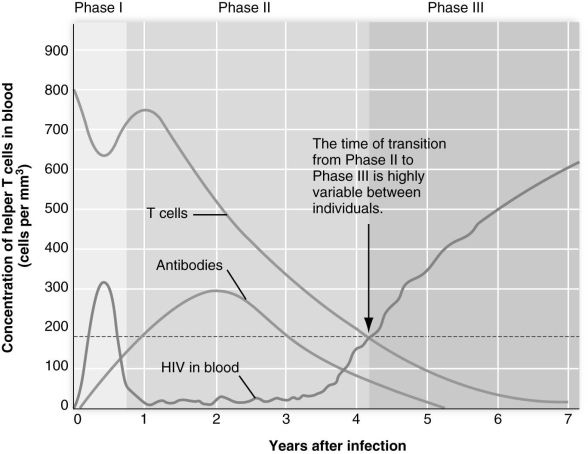Exam 9: The Immune System and Mechanisms of Defense
Exam 1: Human Biology, Science, and Society85 Questions
Exam 2: The Chemistry of Living Things118 Questions
Exam 3: Structure and Function of Cells124 Questions
Exam 4: From Cells to Organ Systems107 Questions
Exam 5: The Skeletal System95 Questions
Exam 6: The Muscular System107 Questions
Exam 7: Blood114 Questions
Exam 8: Heart and Blood Vessels112 Questions
Exam 9: The Immune System and Mechanisms of Defense118 Questions
Exam 10: The Respiratory System: Exchange of Gases94 Questions
Exam 11: The Nervous System: Integration and Control111 Questions
Exam 12: Sensory Mechanisms107 Questions
Exam 13: The Endocrine System94 Questions
Exam 14: The Digestive System and Nutrition91 Questions
Exam 15: The Urinary System73 Questions
Exam 16: Reproductive Systems97 Questions
Exam 17: Cell Reproduction and Differentiation95 Questions
Exam 18: Cancer: Uncontrolled Cell Division and Differentiation89 Questions
Exam 19: Genetics and Inheritance81 Questions
Exam 20: DNA Technology and Genetic Engineering75 Questions
Exam 21: Development and Aging84 Questions
Exam 22: Evolution and the Origins of Life89 Questions
Exam 23: Ecosystems and Populations85 Questions
Exam 24: Human Impacts, Biodiversity, and Environmental Issues74 Questions
Select questions type
Antibiotics are most likely to be effective in the treatment of infections caused by
Free
(Multiple Choice)
4.9/5  (35)
(35)
Correct Answer:
A
Which one type of cells is responsible for producing and releasing antibodies?
Free
(Multiple Choice)
4.9/5  (32)
(32)
Correct Answer:
B
Which immune system cell must be presented with antigen by an antigen-presenting cell such as a macrophage, in order to become appropriately activated?
Free
(Multiple Choice)
4.7/5  (35)
(35)
Correct Answer:
D
Following transplant surgery, a patient is given ________ drugs that block the action of the immune response against the transplanted organ.
(Short Answer)
4.9/5  (27)
(27)
 Referring to the figure above, the progression from Phase II HIV infection to Phase III is marked by
Referring to the figure above, the progression from Phase II HIV infection to Phase III is marked by
(Multiple Choice)
4.8/5  (36)
(36)
Once a macrophage engulfs a bacterium, what happens to the foreign cell?
A) It is released into the lymph system for removal from the body.
B) It is released into the digestive tract for removal from the body.
C) The macrophage is attacked by antibodies, killing the cell and bacterium.
D) Antibodies penetrate the macrophage to lyse the bacterial cell.
E) The bacterium is killed by digestive enzymes released from lysosomes.
(Short Answer)
4.7/5  (32)
(32)
The human body uses three lines of defense to protect against pathogens. Match each of the following categories of defense to the type of cell or mechanism involved in the defense. Answers may be used more than once.
-acidic pH of skin
(Multiple Choice)
4.7/5  (37)
(37)
During a bacterial infection, the human body usually responds by having an elevated body temperature or a fever. Most over-the-counter cold medications indicate that they contain a fever suppressant. Explain why this is not always good for the treatment of a cold or infection.
(Essay)
4.8/5  (35)
(35)
Bacterial pathogens cause symptoms of a disease by invading host cells or by producing toxins that damage host cells.
(True/False)
4.8/5  (33)
(33)
The human body uses three lines of defense to protect against pathogens. Match each of the following categories of defense to the type of cell or mechanism involved in the defense. Answers may be used more than once.
-inflammation
(Multiple Choice)
4.8/5  (35)
(35)
The human body uses three lines of defense to protect against pathogens. Match each of the following categories of defense to the type of cell or mechanism involved in the defense. Answers may be used more than once.
-cytotoxic T cells
(Multiple Choice)
4.9/5  (37)
(37)
One role of MHC proteins is that they serve as self markers to the human immune system.
(True/False)
4.8/5  (43)
(43)
Plasma cells and memory cells are types of ________ lymphocytes; both types of cells secrete proteins called ________ as part of the immune response.
(Short Answer)
4.8/5  (31)
(31)
A life-threatening allergic reaction (difficulty in breathing, fall in blood pressure, severe stomach cramps) is known as ________.
(Short Answer)
4.9/5  (27)
(27)
Individuals infected with HIV produce antibodies, but these antibodies do not prevent progression to Phase II and Phase III of infection.
(True/False)
4.8/5  (33)
(33)
Antibodies are classified by size, location, and function, and which one of the following represents the most common type of immunoglobulin?
(Multiple Choice)
4.8/5  (43)
(43)
The release of chemicals from injured cells triggers histamine release from
(Multiple Choice)
4.8/5  (29)
(29)
The thymus gland, which is responsible for the development of T cells, stops growing during adolescence and shrinks as one grows into adulthood.
(True/False)
4.9/5  (41)
(41)
While T lymphocytes are maturing, each of them develops one of two sets of proteins on their cell surface. These proteins are known as ________ and ________.
(Short Answer)
4.7/5  (29)
(29)
Showing 1 - 20 of 118
Filters
- Essay(0)
- Multiple Choice(0)
- Short Answer(0)
- True False(0)
- Matching(0)